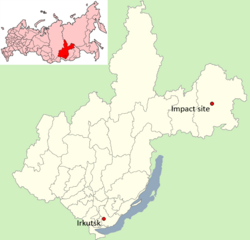History:2002 Vitim event

The 2002 Vitim event or Bodaybo event is believed to be an impact by a bolide (fireball) in the Vitim River basin. It occurred near the town of Bodaybo in the Mamsko-Chuisky district of Irkutsk Oblast, Siberia, Russia on September 25, 2002 at approximately 22:00 (local time, UTC/GMT +9 hours: ISO 8601 format 2002-09-25T13:00Z). The event was detected by a US military missile-defense satellite.[1]
Analysis
Attempts were made to define the magnitude of the explosion. U.S. military analysts calculated it was around 0.86 terajoules (0.21 kilotonnes of TNT).[1] Peter Brown estimates the total yield of both Bodiabo and Tagish Lake at about 2 kilotons—a factor of roughly 10,000 less than the Tunguska event.[1] Russian physicist Andrey Olkhovatov estimates it at 4–5 kilotons.[citation needed]
Information about the event appeared in the mass media and among scientists after only a week. A small expedition, sent by the Institute of Sun–Earth Physics (Irkutsk), tried to find a meteorite within about 10 km from Bodaybo town (people told them– "it has fallen beyond the nearest mountain").
Expeditions
- 1st — Russian EMERCOM team attempted to find fragments of the meteorite near Bodaybo.
- 2nd — October, 2002 expedition of Irkutsk State University (leader S. Yazev).
Official expeditions in 2002–2003 never reached the impact site, situated in remote Siberian taiga.
Kosmopoisk expedition
As reported by the ufology organization Kosmopoisk, in May 2003 an expedition, performed by Kosmopoisk (leader — Vadim Chernobrov) reached a presumed impact point (about 50 km from Vitimsky settle point). The situation there looked similar to that of the Podkamennaya Tunguska River after the Tunguska event in 1908.[citation needed][dubious ] Snow and water samples were analyzed and found to contain an abnormal amount of tritium, as well as radioactive isotopes of cobalt and caesium.[citation needed] Chernobrov suggested that the Vitim event could be caused by a low density comet nucleus with a diameter of about 30–100 meters.[citation needed]
See also
- List of meteor air bursts
- Eastern Mediterranean event
References
- ↑ 1.0 1.1 1.2 "CCNet 55/2003 - 10 July 2003". Cambridge Conference Network archive. http://abob.libs.uga.edu/bobk/ccc/cc071003.html. Retrieved 2014-05-02.
External links
- The Vitim bolide at Meteorites Australia (Meteorites.com.au) (latest update 26 March 2006)
- CCNet bulletin 50/2003 (7 June 2003), Cambridge Conference Network archive
- CCNet bulletin 55/2003 (10 July 2003), Cambridge Conference Network archive
- Whitehouse, David (8 October 2002). "Cash plea for space impact study". BBC News. http://news.bbc.co.uk/2/hi/science/nature/2309117.stm. Retrieved 3 April 2014.
- Shepherd, Robin (June 7, 2003). "Siberia meteorite flattens 40 sq miles". timesonline.co.uk. Archived from the original on March 10, 2007. https://web.archive.org/web/20070310232728/http://www.timesonline.co.uk/tol/news/world/article1139561.ece.
- Kasatkina, E.A. & Shumilov, O.I. (2005). Some atmospheric and magnetospheric effects possibly related to the Vitim bolide impact. Retrieved June 24, 2005. [1]
- Chernobrov, Vadim & Soleny, Alexander & Lawrence, Maria (2003). Results from the VITIM-2003 expedition [2]
[ ⚑ ] 58°16′16″N 113°27′13″E / 58.271016°N 113.453579°E

